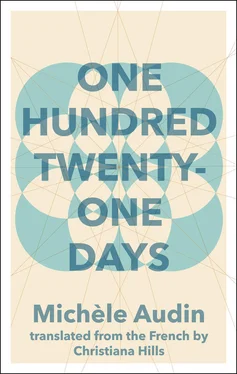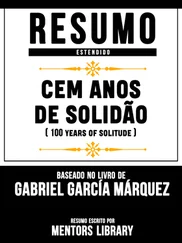Coincidences… the publication of M.’s letters in the planning stage in 2005, return to N. in 2006. While seeking out the beneficiaries, met Pierre Meyer. He saved Bernadette M.’s papers, among which was the diary kept by her mother, Marguerite Janvier, during World War I, along with letters, announcements. And Mireille Duvivier’s papers. Thanks to Marguerite’s diary from the hospital, connection with Gorenstein. From Pierre, information on Silberberg and the story of Mireille Duvivier (another connection with Gorenstein) and her one hundred twenty-one days of happiness.
POUCH 2
HANDWRITTEN LETTER FROM IGNACE M. TO HIS SISTER BERNADETTE (10-15-44)
(copy, original with Pierre Meyer)
Paris, October 15, 1944
My dearest big sister,
Since you left for Normandy two weeks ago, things have gotten worse here. I know you’re looking for peace and solitude in the country, but I’m writing to ask you to please return to Chatou because Mama is not at all well. She is very depressed, does not talk to anyone, and spends all day in a chair or in bed, staring into space, doing nothing. I don’t know what has caused this listlessness. Maybe it’s simply the repercussions of the strange and terrible years we’ve just lived through.
You and I have already spoken about this, and I still don’t know what she really thought about Papa’s public stances and his German friends. Now with the Liberation, and Papa’s suspension, maybe this, too, is eating away at her. Our grandparents’ arrival has not helped things. Grand-Papa is very authoritative and, since the time he and Grand-Mama arrived, it feels like he’s the one in charge of the house. For several days, because of the state Mama is in, Marthe has been taking care of everything, but under Grand-Papa’s orders.
I beg you, my dear Bernadette, please don’t show this letter to anyone. I’m sure Papa will take care of things in order to impress the purge committee and nothing will happen to him. I’m also sure Mama knows this, she’s used to it, so on the one hand she has no reason to worry and on the other, it’s actually more depressing. I must add that our grandparents didn’t need to come all the way here. Grand-Papa screams that Papa is an imbecile, and the atmosphere reminds me of the worst points of Papa’s anger when we were little. We’re nearly expecting to witness a belt beating, like the time when you secretly brought me chocolate, do you remember? When I see them together, I’m almost sure Papa was beaten with a belt when he was a child, too.
Even though the tense atmosphere I’ve described here is worse than it was before you left, you have to come back. Mama needs someone who will talk to her like you do, Thérèse has far too much to do taking care of the baby, and the three others can only fall down on their knees and pray. My dear Bernadette, I beg you, come back.
Your little brother who loves you,
Ignace
P.S. What’s more, I’m going to need a little support as well: I’m being reprimanded for going to Tiedemann’s house in Germany to join the Compulsory Work Service, and I have to explain myself in front of a committee at school. See why you can’t stay far away?
Note: Research trip (under the cover of forced labor) for the son, perhaps negotiated over the dinner of July 1943? How could one possibly know?
POUCH 3
WRITTEN NOTES ON M.
M.’s statements at the purge committee (summarized by Pierre Meyer): the sole aim of his relations with the Germans was to ease the plight of our prisoners of war; the talks in Germany had been ordered by the minister.

Look in the archives of the purge committee (at the National Archives).
Announcement: It pleased God to call to Himself Marguerite Janvier, wife of M., deceased on the 28th of February, 1945, after a long and painful illness.

M.’s wearing of mourning clothes was ostentatious (per Pierre Meyer).

M.’s second daughter, Marthe, took care of him (she stopped her studies) from when Marguerite died until her own death in 1990.

Pierre and Bernadette were married in December 1945, a civil ceremony (Ignace M. was Bernadette’s witness, Mireille Duvivier was Pierre’s witness, no announcement?). After completing their studies, she became a pediatrician and he a professor of mathematics. Two daughters, Andrée and Nathalie, born in 1948 and 1950.

Does M. have any other surviving archives? Pierre Meyer doesn’t know.
POUCH 4
HANDWRITTEN NOTES TAKEN AFTER THE INTERVIEWS WITH PIERRE MEYER
(Pages torn from the blue notebook)
On Doctor Sonntag . See the booklet dedicated to him by the University of Strasbourg. Evacuated to Clermont in 1939, arrested as a member of the Resistance, sent to Drancy as a Jew, Convoy 57 for Auschwitz. At Monowitz, directs the Revier (sick bay? the word “hospital” hardly seems accurate). He gets Silberberg assigned there (one of his patients from before the war). Meets Meyerbeer (the psychiatrist), who is also deported and treated (?) at the Revier. Buchenwald after the death march (evacuation of Auschwitz). Resumed his life in Strasbourg, testified at Nuremberg, wrote a text, in 1947, on Monowitz marked with an incredible sense of responsibility.
On Silberberg . See the booklet on Sonntag and Louis Klein’s book. Mobilized (in aviation) in 1939. After the armistice and demobilization, appointed senior teacher at a high school in Digne, then dismissed (Statute on Jews of October 3, 1940). Then (December 1940? January 1941?) in Clermont-Ferrand (research in number theory, private tutoring to earn a living). Rounded up by the Nazis in June 1943. Drancy, Convoy 60 for Auschwitz. Secretary of the Revier at Monowitz. Died at Mariahilf in April 1945.
POUCH 5
NOTES TAKEN AT THE LIBRARY OF THE CHEMISTRY LABORATORY IN P. (12-18-08)
(François Ollier Archive Collection)
Huge archives, lots of information on the France-Germany Committee, then the collaboration (great for those who want to write a biography of Ollier!):
• Family letters, newspaper clippings. Military passbook. Notebooks. His wife’s scrapbooks (recipes, invitations).
• Carbon copy of a letter, addressee unknown, recounting the reception at Göring’s (Olympic Games of 1936), “a whole new world is emerging,” five typed pages.
• Newsletter from the France-Germany Committee, 1937.
• Letter to the weekly magazine Les Temps Nouveaux , 1941.
• Letter to the chemists of IG Farben, 4-6-43.
• Incarcerated until 12-23-44 at Les Tourelles camp. Freed (under surveillance).
• Notes for the lawyer: “Relations with German authorities in order to defend the freedom and maintenance of the scientific press. I have never had any contact with students, and I cannot be reprimanded for having exerted any kind of harmful influence on young people.”
• Notes “for an appeal from my colleagues to the judge”: “I was added to the Groupe Collaboration by surprise, resigning from it would have been viewed as tactless.”
• Petition to the Minister of the Interior.
• Case closed, March 1948.
Читать дальше













